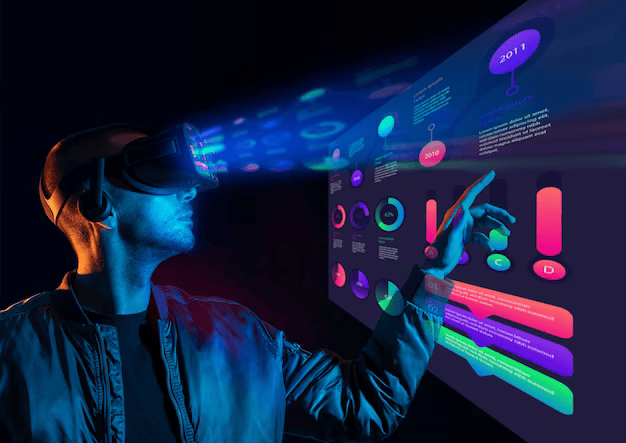In the ever-evolving landscape of interactive entertainment, the gaming industry is currently undergoing a radical transformation, driven by cutting-edge technologies and innovative concepts. Blockchain-based advancements, including DApp development services, have emerged as a catalyst for this revolution, bringing forth a wave of possibilities that extend far beyond the boundaries of traditional gaming.
In this blog post, we’ll explore the future of interactive entertainment, focusing on the integration of blockchain, metaverse development, NFTs, Web3, play-to-earn models, and more, with a specific emphasis on the pivotal role of DApp development services in shaping the gaming industry’s trajectory.
Metaverse Game Development: Navigating the Virtual Frontier
The concept of the metaverse has captured the imaginations of gamers worldwide, envisioning a vast virtual realm where communication, socialization, and diverse activities seamlessly intertwine. Metaverse game development is paving the way for interconnected virtual worlds, creating a gaming universe where players can fluidly traverse different realms. These immersive experiences empower players to interact, trade, play, and contribute content in an ever-expanding metaverse.
NFT Game Development: Owning the Digital Realm
Non-fungible tokens (NFTs) have disrupted traditional notions of ownership within gaming. Serving as digital certificates of authenticity, NFTs validate ownership of in-game items like goods, skins, and characters on blockchain platforms. This decentralized approach allows players to trade, sell, or showcase their digital collections, emphasizing the uniqueness and scarcity of these virtual assets.
Web3 Game Development: Empowering Players with True Ownership
Web3 game development, enabled by blockchain technology on decentralized networks, is a revolutionary departure from centralized gaming systems. Through smart contracts, players gain authentic ownership of in-game assets, a stark contrast to conventional games where developers retain control. NFTs play a crucial role in establishing the distinct, verifiable, and unassailable nature of these digital assets.
Play-to-Earn & Move-to-Earn Game Development: Redefining the Gaming Economy
The advent of play-to-earn and move-to-earn gaming models has democratized gaming by allowing players to earn real-world value through their gameplay efforts. Play-to-earn games incentivize players to participate in various in-game activities, contributing to the game’s economy in exchange for tangible rewards. Move-to-earn games leverage real-world physical movements, monitored through wearable technology or smartphone apps, promoting a healthier lifestyle while rewarding players for their achievements.
Crypto Game Development & Smart Contract DApp Game Development: The Dawn of Decentralized Gaming
The fusion of smart contracts and cryptocurrencies has given rise to decentralized applications (DApps) in the gaming industry. These DApps incorporate play-to-earn mechanisms, decentralized marketplaces, and community-driven governance, ensuring secure and transparent gaming experiences through blockchain technology. Crypto games utilize digital tokens as in-game currencies, fostering a dynamic ecosystem where players can earn, trade, and utilize tokens within the game.
NFT Lottery Game Development: Blending Chance and Blockchain Assets
NFT lottery games introduce an intriguing fusion of randomness and blockchain assets. Players engage in lotteries with prizes consisting of exclusive NFTs, enhancing trust through the transparent and fair winner selection process facilitated by blockchain technology.
Expanding Gaming Horizons: Role-Playing, Crypto Breeding, and Unity 3D Game Development
The gaming industry’s diversity continues to grow, offering a multitude of experiences to cater to varying interests. Role-playing games immerse players in expansive worlds and intricate narratives, while crypto breeding games introduce innovative features tied to genetics and rarity, utilizing NFTs to represent collectible assets. Unity 3D, a powerful game development tool, enables developers to push the boundaries of visuals and interactions, creating captivating gaming worlds with lifelike graphics and fluid gameplay.
Challenges and Opportunities: Scaling the Peaks of Innovation
While the integration of blockchain technology into gaming opens up new frontiers, challenges must be carefully navigated. Scalability remains a significant hurdle, especially in handling high-volume gaming transactions without compromising efficiency. Ensuring accessibility for players with varying technical proficiency and technology access is crucial for universal adoption. Additionally, sustainability concerns regarding the energy consumption of certain blockchain networks highlight the need for environmentally conscious solutions.
Conclusion
In conclusion, the synergy between blockchain technologies and innovative gaming concepts is indispensable for the future of interactive entertainment. As creators continue to push boundaries and explore uncharted territories, the potential to craft immersive, gratifying, and inclusive gaming experiences is limitless. Embracing these advancements will undoubtedly reshape the gaming landscape, creating a vibrant ecosystem that redefines how we play, communicate, and engage with virtual environments. The convergence of creativity and technology is propelling interactive entertainment into uncharted territories, transcending the limitations of traditional gaming and heralding a new era of gaming experiences.
Read Also: Say Goodbyе to Musty Smеlls with Carpеt Clеaning Sеrvicеs



